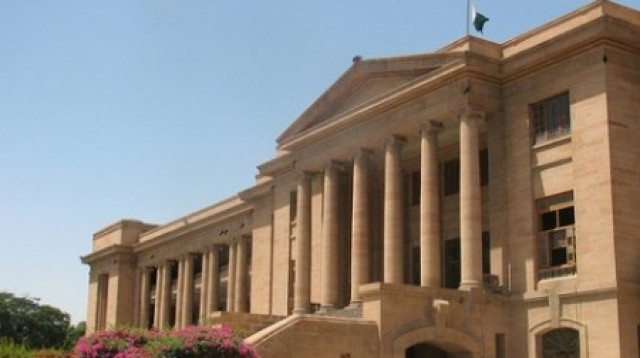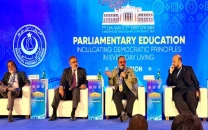For swift justice : In a first, SHC transfers terrorism cases to sessions court
Sindh prosecutor general argues that SHC has the authority to do so.

The Sindh High Court made history on Monday by telling district and sessions courts to hear anti-terrorism cases because of the government’s inability to appoint judges.
The order is the first of its kind in judicial history ever since the Anti-Terrorism Act was promulgated. According to these laws, an anti-terrorism court has to wrap up a trial within seven days and the Sindh High Court, which is the appellate court, must decide an appeal within 14 days.
This significant development was the outcome of an application filed by a man who is being tried by an ATC for killing a policeman. Bilal Zafar Farooqui is being tried by the Anti-Terrorism Court (ATC) III on charges of killing an assistant sub-inspector (ASI), Muhammad Javed, who was posted as court moharir, investigations, at Liaquatabad police station. ASI Javed was going to the city courts complex from his police station when unidentified men shot and killed him on Nishtar Road on October 5, 2010.
Farooqui filed an application under Section 23A of the Anti-Terrorism Act, 1997, asking for his trial to be transferred from the ATC to a sessions court as there is a dearth of judges at the the ATC.
There are five ATCs in Karachi and but none of them have judges. There are at least 100 cases pending at present. There are five district and sessions courts in the city and all of them have judges. District and sessions courts are usally tasked with hearing routine criminal matters, as opposed to special courts such as the ATCs or anti-narcotics courts.
Sindh Prosecutor-General Shahdat Awan and the law secretary attended Monday’s hearing. Awan told the court that once an ATC takes up a case, it is required to hear and decide it within a week. He also referred to Section 14 (5): “When a judge is temporarily unable to perform his duties, with the consent of the chief justice, another Sessions Judge could be nominated to conduct urgent proceedings.”
Additionally, Article 10AA of the Constitution (under the 18th amendment) says that if you are accused of a crime you have the right to a fair trial. Furthermore, as the SHC is a “supervisory court” it has ample authority to pass directions under Article 199 (1)(c), Awan argued, citing Article 203 of the Constitution.
In his order, the chief justice said that, “a quick trial of a heinous offence is the right of an accused person and is also a deterrent for others as due to a delay, witnesses can be won over and some evidence also diminishes in value”.
Invoking its supervisory jurisdiction, the bench then disposed of the application by Bilal Zafar Farooqui and directed all the district and sessions judges to hear and decide the application under Section 23 until judges are appointed in the Sindh Anti-Terrorism Courts.
Published in The Express Tribune, May 10th, 2011.



















COMMENTS
Comments are moderated and generally will be posted if they are on-topic and not abusive.
For more information, please see our Comments FAQ